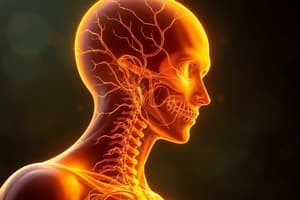Podcast
Questions and Answers
How many pairs of cranial nerves are there in the peripheral nervous system?
How many pairs of cranial nerves are there in the peripheral nervous system?
- 8 pairs
- 31 pairs
- 5 pairs
- 12 pairs (correct)
Which of the following correctly maps the number of spinal nerve pairs?
Which of the following correctly maps the number of spinal nerve pairs?
- 6 pairs cervical, 10 pairs thoracic, 4 pairs lumbar
- 8 pairs cervical, 12 pairs thoracic, 5 pairs lumbar (correct)
- 10 pairs cervical, 5 pairs sacral, 7 pairs lumbar
- 8 pairs cervical, 12 pairs thoracic, 1 pair coccygeal
What does 'CN' in CN1-CN12 represent?
What does 'CN' in CN1-CN12 represent?
- Cervical nerve
- Cranial nerve (correct)
- Central nerve
- Cortex nerve
How many pairs of sacral spinal nerves are there?
How many pairs of sacral spinal nerves are there?
Flashcards
Peripheral Nervous System
Peripheral Nervous System
The peripheral nervous system (PNS) consists of all the nerves that extend outside of the central nervous system (CNS), including the brain and spinal cord.
Cranial Nerves
Cranial Nerves
Cranial nerves are a set of 12 pairs of nerves that originate from the brain and control functions like smell, sight, hearing, taste, and movement of facial muscles.
Spinal Nerves
Spinal Nerves
Spinal nerves are a set of 31 pairs of nerves that branch out from the spinal cord, responsible for controlling movements and sensations in the body.
Cervical Nerves
Cervical Nerves
Signup and view all the flashcards
Thoracic Nerves
Thoracic Nerves
Signup and view all the flashcards
Study Notes
Peripheral Nervous System Overview
- The peripheral nervous system (PNS) includes 12 pairs of cranial nerves and 31 pairs of spinal nerves.
- Cranial nerves (CN1-CN12) are associated with the brain, specifically the skull.
Spinal Nerves
- Spinal nerves branch from segments of the spinal cord.
- Specific spinal nerve pairs exist for the different segments:
- 8 pairs of cervical nerves
- 12 pairs of thoracic nerves
- 5 pairs of lumbar nerves
- 5 pairs of sacral nerves
- 1 pair of coccygeal nerves
Cranial Nerve Functions (Illustrative Examples)
-
This section focuses on the general functions, illustrative examples regarding the functionality of specific cranial nerves are shown from the figure.
-
Olfactory (I): Smell
-
Optic (II): Vision
-
Oculomotor (III), Trochlear (IV), Abducens (VI): Eye movement.
-
Trigeminal (V): Facial sensation and chewing.
-
Facial (VII): Facial expressions and taste.
-
Vestibulocochlear (VIII): Hearing and balance.
-
Glossopharyngeal (IX): Taste and swallowing.
-
Vagus (X): Extensive functions, including digestive organs, heart rate.
-
Accessory (XI): Neck and shoulder movement.
-
Hypoglossal (XII): Tongue movement.
Spinal Nerve Functions (Illustrative Examples)
-
This section focuses on general functions (illustrative examples regarding the functionality of specific spinal nerves have been shown from the figure).
-
Cervical nerves (C1-C8): Control neck, shoulder, and upper limb movements.
-
Thoracic nerves (T1-T12): Involved in functions throughout the trunk and contribute to sympathetic tone (e.g., temperature regulation).
-
Lumbar nerves (L1-L5): Control lower limb movements.
-
Sacral nerves (S1-S5): Involved in bowel and bladder function, and sexual function.
-
Coccygeal nerve (CO): Innervates muscles and skin around the coccyx.
Studying That Suits You
Use AI to generate personalized quizzes and flashcards to suit your learning preferences.




